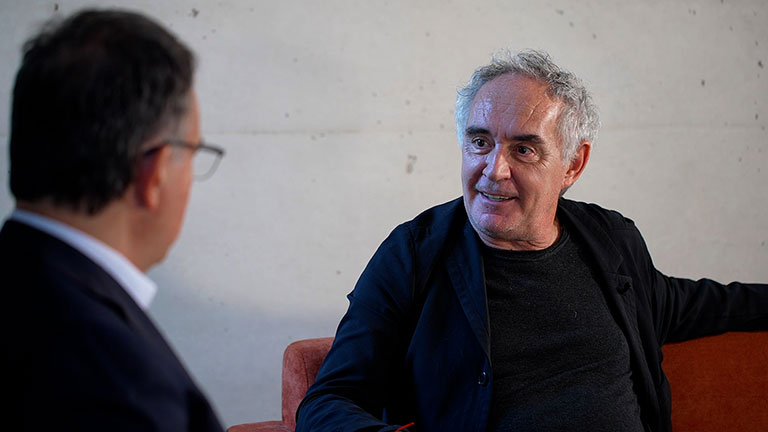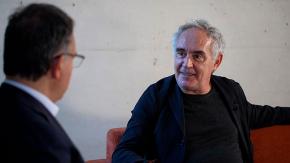
Ferran Adrià: "Everyone talks about innovation, but nobody knows their level of innovation"

Ferran Adrià: "Everyone talks about innovation, but nobody knows their level of innovation"
Business 21 January 2022
Marcel Planellas, Professor in the Department of Strategy and General Management, talks with Ferran Adrià, president of theBullifoundation, on how to help managers and entrepreneurs who face the need to innovate to drive the transformation of their organizations, developing new tools that allow them to audit the company’s innovative system and make their change projects a reality.
TRANSCRIPT
Marcel Planellas: Thank you for accepting the invitation from Do Better to discuss managing innovation in companies. We believe that innovation management is a challenge for companies – and it is not clear what kinds of tools are needed.
The El Bulli restaurant is an example of innovation that we have studied. Ferran, what are the challenges or aspects of El Bulli in its innovation process that you would highlight?
Ferran Adrià: It was a business model where the restaurant was not the business – we had a consulting company. We had an incredible three-person creative team for 18 years, which is not easy to manage. One of the reasons for our success was the mutual admiration we had for each other – and having more time and money to invest than the others.
Marcel Planellas: You built an innovation system. The team worked six months in the workshop to generate innovations and another six months in the restaurant to...
Ferran Adrià: ...to test innovations. Yes, for six months we prepared intermediate dishes, because in a restaurant there are intermediate creations, the dishes for tasting, and the structure of these dishes (which can be a la carte or a set menu). You can create in these three fields. In the workshop we did the first field – intermediate dishes – and then we built phrases with these words.
Marcel Planellas: But the innovation goal was very ambitious because you renewed 100% of the menu every season.
Ferran Adrià: Yes, this started without a defined strategy, and we progressively incorporated it. We were playing in the Champions League. We had to change everything every year and that was crazy. But if we are talking about it now, it is because El Bulli achieved something special, and we condensed into 20 years what should have taken 70 years.
Marcel Planellas: You broke new ground because the diners and specialized critics expected that they would see a completely new menu every year.
Ferran Adrià: Yes, the menu had to be conceptually different from the previous year. We managed to do that, and we still wonder why. Your book, El libro rojo de la innovación, provides part of the explanation. We are still analyzing why a small place achieved so much.
Marcel Planellas: Every year you audited your innovations – then you registered and published your new creations in a book. You told me that you insisted on establishing what was new so that it could be placed in the El Bulli catalog.
Ferran Adrià: Of course. It was useful to make a comparison with the previous year, so as not to copy ourselves, and to really see what we had newly created. After we made this audit, there were some years when we were very happy – but there were other years when we said: ‘Damn!’
Marcel Planellas: Because you were not sufficiently creative?
Ferran Adrià: Not for the client level. The client's level was another level...
Marcel Planellas: Following your experience with this innovation audit tool, do you believe that it could be useful for companies and organizations in other sectors?
Ferran Adrià: An audit begins by cataloguing everything. There are so few innovation audits. Everyone talks about innovation, but no one controls the level of innovation.
Marcel Planellas: Companies must exploit their current business day-to-day business, as well as detecting new opportunities, being innovative, and adapting to change.
Ferran Adrià: We have been innovating for two and a half million years, but it sometimes seems that innovation is something new. However, it is also true that maintaining such an elevated level of innovation is difficult. That is why an innovative attitude is important – people must be open to change. When you say: ‘Hey, let's change this’ people should be positive instead of replying: ‘Oh, no, that's too complicated’. This positive attitude to change must be part of the DNA of your company.
Marcel Planellas: Moreover, change can be found in the product or any other part of the company – in its business model, in purchasing, in service, in distribution, and so on.
Ferran Adrià: Or in production.
Marcel Planellas: The audit opens the diagnostic part and then the proactive part of the objectives. There are people who think that you either innovate or you do not innovate – but there are various levels of innovation that vary from company to company. It can be useful to determine at what levels you want to innovate.
Ferran Adrià: Honest copying is a fantastic way to innovate. Then comes the adaptation of successful models (where you change some things); then incremental innovation (which is a higher level); then disruptive innovation; and finally, radical innovation. I really like the adaptation of successful models – and I believe that 99% of small firms should adapt successful models, but in a reflexive way so that it is a living thing. A copy is not a living thing: the organization copies and that's it. The adaptation of a successful model questions why it has been successful – and little changes get made if there is an innovative spirit and attitude.
Marcel Planellas: We are here at Esade, a business school where we train young people in the BBA and professionals in the MBA. I am sure that during their professional careers, people will encounter situations – and even professions – that may not yet exist. People will have to lead innovation processes, and I believe that being open to change helps.
Ferran Adrià: When you are in business, you must ask yourself about the essence of that business. Hairdressing, for example, also involves innovation – but in a different way. This cannot be done online.
Ferran Adrià: You must be clear about what it means – so that you can sell or have a website to manage customers. It is important to understand your business.
Ferran Adrià: If you are in banking, you are in banking; if you are in a hairdressing salon, then you are in a hairdressing salon. Synergy means you often do not really know where you are.
Marcel Planellas: You cannot innovate without this knowledge. However, a mistaken idea has been created that you can innovate without a profound understanding of the business.
Ferran Adrià: You must understand what already exists. If I am going to innovate with a digital newspaper, then I must be aware what already exists. We must understand our economic activity – and the internet enables you to be aware of everything that is happening. It is very important to understand what is happening and then be continuously developing yourself. You must be learning all the time.
Marcel Planellas: Very good. We are agreed that innovation management is one of the challenges of the future. Thank you very much, Ferran.
Ferran Adrià: You're welcome.
- Compartir en Twitter
- Compartir en Linked in
- Compartir en Facebook
- Compartir en Whatsapp Compartir en Whatsapp
- Compartir en e-Mail
Do you want to receive the Do Better newsletter?
Subscribe to receive our featured content in your inbox.